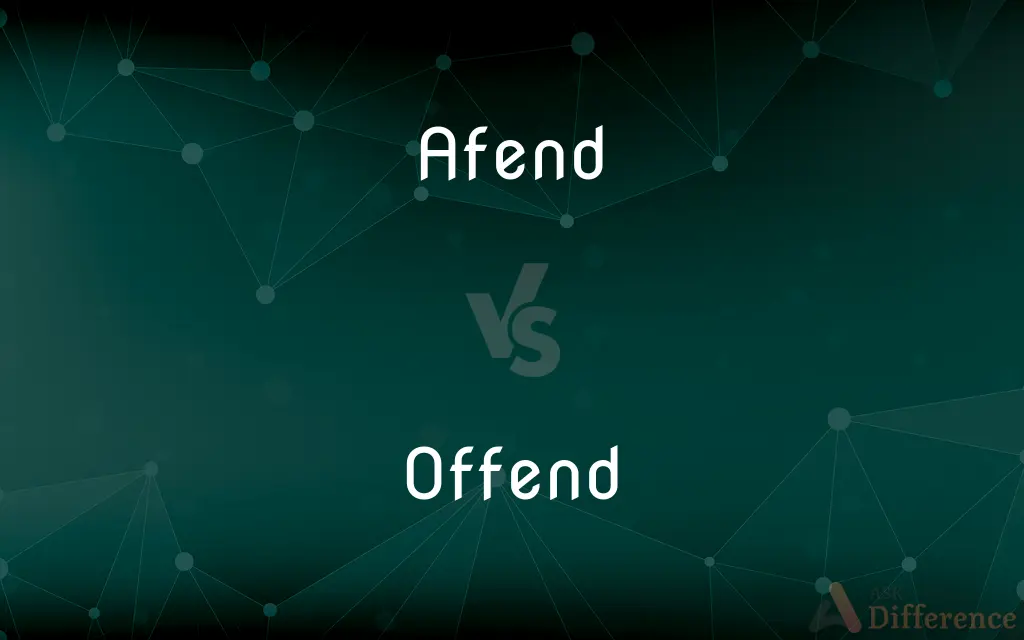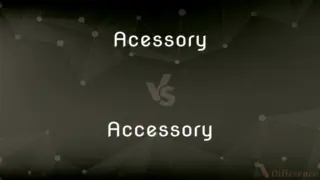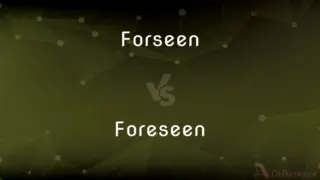Afend vs. Offend — Which is Correct Spelling?
Edited by Tayyaba Rehman — By Fiza Rafique — Updated on April 1, 2024
Afend is an incorrect spelling of Offend. "Offend" refers to causing upset, annoyance, or resentment through one's actions or words.

Table of Contents
Which is correct: Afend or Offend
How to spell Offend?

Afend
Incorrect Spelling

Offend
Correct Spelling
ADVERTISEMENT
Key Differences
Recognize that "offend" and "offensive" both describe causing upset and share the "off" prefix.
"Offend" contains "off" like the related term "offensive."
Be mindful that “offend” shares its start with other words like "offer" and "officer," which could aid memory.
Utilize mnemonics, for instance: Only Fearless Folks Express Naked Disdain.
Engage in writing “offend” multiple times to build muscle memory and familiarity with its correct spelling.
ADVERTISEMENT
How Do You Spell Offend Correctly?
Incorrect: I didn't mean to afend you with my comment.
Correct: I didn't mean to offend you with my comment.
Incorrect: Will this joke afend anyone at the party?
Correct: Will this joke offend anyone at the party?
Incorrect: He tried not to afend his guests with his opinions.
Correct: He tried not to offend his guests with his opinions.
Incorrect: She was afraid her words would afend her friend.
Correct: She was afraid her words would offend her friend.
Incorrect: It's important not to afend people with careless remarks.
Correct: It's important not to offend people with careless remarks.
Offend Definitions
Offend may imply breaching a moral or social code.
The violation did offend societal norms.
Offend implies being disagreeable or objectionable to one's senses.
The odor might offend the nose.
Offend involves causing upset or displeasure.
His comment did offend several people.
To cause displeasure, anger, resentment, or wounded feelings in
We were offended by his tasteless jokes.
To be displeasing or disagreeable to
Onions offend my sense of smell.
To result in displeasure
Bad manners may offend.
To violate a moral or divine law; sin.
To violate a rule or law
Offended against the curfew.
(transitive) To hurt the feelings of; to displease; to make angry; to insult.
Your accusations offend me deeply.
(intransitive) To feel or become offended; to take insult.
Don't worry. I don't offend easily.
(transitive) To physically harm, pain.
Strong light offends the eye.
(transitive) To annoy, cause discomfort or resent.
Physically enjoyable frivolity can still offend the conscience
(intransitive) To sin, transgress divine law or moral rules.
(transitive) To transgress or violate a law or moral requirement.
To cause to stumble; to cause to sin or to fall.
To strike against; to attack; to assail.
To displease; to make angry; to affront.
A brother offended is harder to be won than a strong city.
To be offensive to; to harm; to pain; to annoy; as, strong light offends the eye; to offend the conscience.
To transgress; to violate; to sin against.
Marry, sir, he hath offended the law.
To oppose or obstruct in duty; to cause to stumble; to cause to sin or to fall.
Who hath you misboden or offended.
If thy right eye offend thee, pluck it out . . . And if thy right hand offend thee, cut it off.
Great peace have they which love thy law, and nothing shall offend them.
To transgress the moral or divine law; to commit a crime; to stumble; to sin.
Whosoever shall keep the whole law, and yet offend in one point, he is guilty of all.
If it be a sin to covet honor,I am the most offending soul alive.
To cause dislike, anger, or vexation; to displease.
I shall offend, either to detain or give it.
Cause to feel resentment or indignation;
Her tactless remark offended me
Act in disregard of laws and rules;
Offend all laws of humanity
Violate the basic laws or human civilization
Break a law
Strike with disgust or revulsion;
The scandalous behavior of this married woman shocked her friends
Hurt the feelings of;
She hurt me when she did not include me among her guests
This remark really bruised me ego
Offend can relate to committing a transgression.
The shoplifter did offend against the law.
Offend might signify causing emotional hurt.
The film could offend certain viewers.
Offend Meaning in a Sentence
It's easy to offend someone unintentionally in a heated discussion.
Please let me know if my comments ever offend you, as that's never my intention.
He apologized after realizing his joke could offend some of his audience.
The comedian's routine seemed to offend more people than it amused.
The goal of the campaign is to raise awareness without aiming to offend any group.
Using outdated terms can offend people, even if no harm is meant.
When discussing sensitive topics, it's crucial to tread carefully to not offend.
The debate on the topic was intense, with both sides careful not to offend.
She was worried that refusing the invitation would offend her colleague.
Expressions of personal freedom shouldn't offend basic human rights.
The company issued a public apology for an ad that was found to offend many.
The author's new book has sparked controversy for content that some find offensive.
Sometimes, people don't realize their words can offend others deeply.
In an effort to be humorous, one must be careful not to offend inadvertently.
The movie was criticized for stereotypes that offend cultural sensitivities.
It's a skill to express your honest opinions in a way that doesn't offend others.
Common Curiosities
Which vowel is used before Offend?
The vowel "an" can precede "offend": an offend.
Why is it called Offend?
"Offend" derives from the Latin "offendere," meaning to strike against, hence its connotations of causing upset or resentment.
What is the root word of Offend?
The root word is Latin "offendere."
What is the pronunciation of Offend?
It is pronounced as [uh-fend].
Which preposition is used with Offend?
"Against" can be used with offend: offend against.
What is the verb form of Offend?
"Offend" is already a verb.
What is the singular form of Offend?
Offend.
Is Offend a noun or adjective?
Offend is a verb.
What is the plural form of Offend?
Offend does not have a plural form as it is a verb.
Is Offend a negative or positive word?
Generally negative.
Is Offend an adverb?
No.
Is Offend a vowel or consonant?
Offend is a word, not a vowel or consonant.
Is Offend a collective noun?
No.
How many syllables are in Offend?
Two syllables.
How do we divide Offend into syllables?
Of-fend.
What is a stressed syllable in Offend?
The second syllable is stressed: of-FEND.
Which conjunction is used with Offend?
No specific conjunction is tied to "offend."
Is Offend an abstract noun?
No.
Is Offend a countable noun?
No.
Is the Offend term a metaphor?
No.
What part of speech is Offend?
Offend is a verb.
What is the opposite of Offend?
Appease or please.
Is the word Offend a Gerund?
No, but “offending” is its gerund form.
What is the first/second/third form of Offend?
First: Offend, Second: Offended, Third: Offended.
Which article is used with Offend?
"An" can be used with offend, depending on context and sentence structure.
Is the word Offend imperative?
It can be used in an imperative sentence.
Is the word “Offend” a Direct object or an Indirect object?
Neither, as it is a verb.
What is another term for Offend?
Affront or insult.
Which determiner is used with Offend?
Determiners are typically not used with verbs like "offend."
How is Offend used in a sentence?
Example: "The comedian did not wish to offend his audience with inappropriate jokes."
Share Your Discovery

Previous Comparison
Acessory vs. Accessory
Next Comparison
Absurb vs. AbsurdAuthor Spotlight
Written by
Fiza RafiqueFiza Rafique is a skilled content writer at AskDifference.com, where she meticulously refines and enhances written pieces. Drawing from her vast editorial expertise, Fiza ensures clarity, accuracy, and precision in every article. Passionate about language, she continually seeks to elevate the quality of content for readers worldwide.
Edited by
Tayyaba RehmanTayyaba Rehman is a distinguished writer, currently serving as a primary contributor to askdifference.com. As a researcher in semantics and etymology, Tayyaba's passion for the complexity of languages and their distinctions has found a perfect home on the platform. Tayyaba delves into the intricacies of language, distinguishing between commonly confused words and phrases, thereby providing clarity for readers worldwide.









































